- Browse
- Visual Basic
Visual Basic Courses
Visual Basic courses can help you learn programming fundamentals, user interface design, event-driven programming, and database connectivity. You can build skills in writing efficient code, debugging applications, and creating interactive forms. Many courses introduce tools like Visual Studio, which is essential for developing Windows applications, and Microsoft Access, useful for managing data. By working with these tools, you'll gain hands-on experience in building functional applications that can automate tasks and enhance productivity.
Popular Visual Basic Courses and Certifications
 Status: Free TrialFree Trial
Status: Free TrialFree TrialSkills you'll gain: Unified Modeling Language, File I/O, Visual Basic (Programming Language), Database Management, System Software, Databases, Relational Databases, Algorithms, Computer Architecture, Network Security, Computer Hardware, SQL, Computer Science, Development Environment, Data Structures, Object Oriented Programming (OOP), Object Oriented Design, Computer Programming, Microsoft Development Tools, Programming Principles
4.6·Rating, 4.6 out of 5 stars169 reviewsBeginner · Specialization · 3 - 6 Months
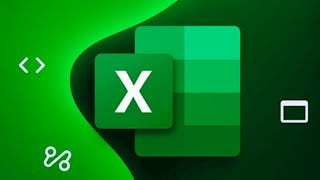 Status: Free TrialFree TrialU
Status: Free TrialFree TrialUUniversity of Colorado Boulder
Skills you'll gain: Excel Macros, Visual Basic (Programming Language), Programming Principles, Data Import/Export, Microsoft Excel, Problem Solving, Computer Programming, Spreadsheet Software, Simulations, Code Review, Algorithms, UI Components, Debugging, Data Management, User Interface (UI), File I/O, Data Cleansing, Automation, Data Validation
4.8·Rating, 4.8 out of 5 stars4.8K reviewsBeginner · Specialization · 3 - 6 Months
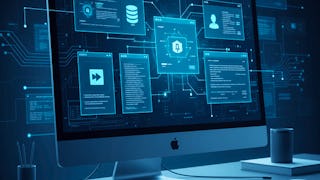 Status: NewNewStatus: Free TrialFree Trial
Status: NewNewStatus: Free TrialFree TrialSkills you'll gain: C# (Programming Language), Data Modeling, User Interface (UI), jQuery, Microsoft SQL Servers, Microsoft Visual Studio, Application Development, User Interface and User Experience (UI/UX) Design, Data Validation, Application Design, Database Application, Business Reporting, Data Management, SQL, .NET Framework, Data Structures, Javascript and jQuery, Programming Principles, Web Development, Maintainability
Beginner · Specialization · 1 - 3 Months
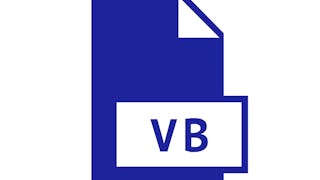 Status: Free TrialFree TrialL
Status: Free TrialFree TrialLLearnQuest
Skills you'll gain: Visual Basic (Programming Language), Development Environment, Microsoft Development Tools, Programming Principles, .NET Framework, Computer Programming, Integrated Development Environments, Application Development, Software Development, Cross Platform Development, Debugging
4.7·Rating, 4.7 out of 5 stars51 reviewsBeginner · Course · 1 - 4 Weeks
 Status: Free TrialFree TrialC
Status: Free TrialFree TrialCCoursera
Skills you'll gain: Excel Macros, Microsoft Excel, Excel Formulas, Visual Basic (Programming Language), Productivity Software, Debugging, Automation, Strategic Decision-Making, Programming Principles
4.5·Rating, 4.5 out of 5 stars260 reviewsBeginner · Course · 1 - 4 Weeks
 Status: NewNewStatus: Free TrialFree Trial
Status: NewNewStatus: Free TrialFree TrialSkills you'll gain: Computer Graphics, Visualization (Computer Graphics), Application Design, C# (Programming Language), UI Components, Software Visualization, .NET Framework, Graphical Tools, Animations, Animation and Game Design, Image Analysis, User Interface (UI), User Interface (UI) Design, Application Development
Beginner · Specialization · 1 - 3 Months
What brings you to Coursera today?
 Status: Free TrialFree TrialU
Status: Free TrialFree TrialUUniversity of Colorado Boulder
Skills you'll gain: Excel Macros, Programming Principles, Visual Basic (Programming Language), Computer Programming, Spreadsheet Software, Problem Solving, Automation, Algorithms, Debugging, Data Management, Data Cleansing
4.8·Rating, 4.8 out of 5 stars4.3K reviewsBeginner · Course · 1 - 3 Months
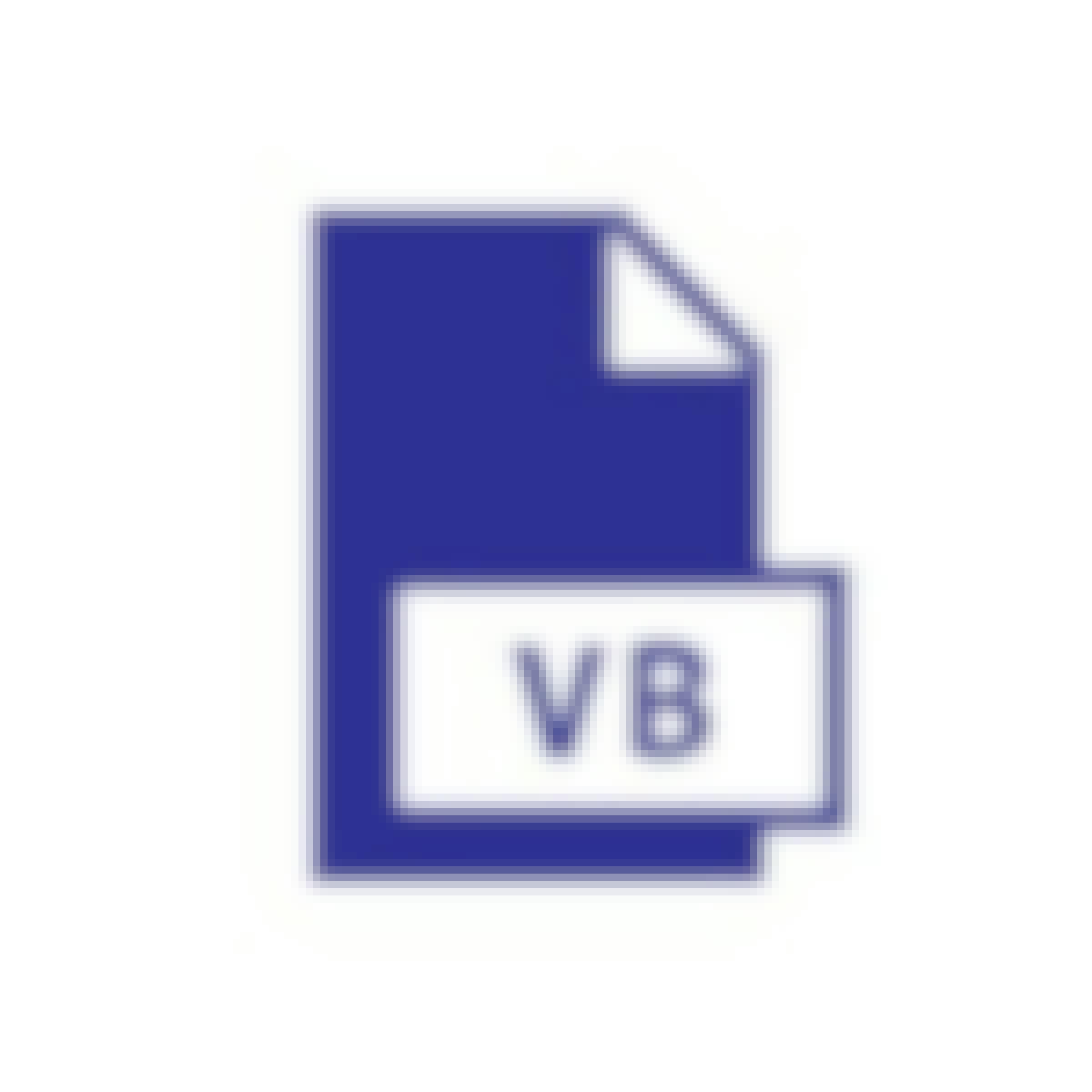 Status: Free TrialFree Trial
Status: Free TrialFree TrialSkills you'll gain: Unified Modeling Language, Visual Basic (Programming Language), Data Structures, Object Oriented Design, Data Modeling, Microsoft Visual Studio, Program Development, Programming Principles, Object Oriented Programming (OOP), .NET Framework, Computer Programming
4.5·Rating, 4.5 out of 5 stars20 reviewsIntermediate · Course · 1 - 4 Weeks
 Status: Free TrialFree TrialM
Status: Free TrialFree TrialMMicrosoft
Skills you'll gain: C# (Programming Language), Object Oriented Programming (OOP), Debugging, .NET Framework, Microsoft Visual Studio, Microsoft Copilot, Computer Programming, Integrated Development Environments, Development Environment, Event-Driven Programming
4.6·Rating, 4.6 out of 5 stars105 reviewsBeginner · Course · 1 - 3 Months
 Status: NewNewStatus: Free TrialFree TrialL
Status: NewNewStatus: Free TrialFree TrialLLogical Operations
Skills you'll gain: Excel Macros, Microsoft Excel, Data Transformation, Data Import/Export, File I/O, Data Wrangling, Extensible Markup Language (XML), Data Manipulation, Visual Basic (Programming Language), Data Cleansing, Spreadsheet Software, Automation, Microsoft 365, Microsoft Office, Data Science, Query Languages, File Management, Debugging, Performance Improvement, Computer Programming
Intermediate · Specialization · 3 - 6 Months

Skills you'll gain: Excel Macros, Visual Basic (Programming Language), Data Structures, Scripting, Programming Principles, Automation, Scripting Languages, Microsoft Development Tools, Computational Logic
4.4·Rating, 4.4 out of 5 stars7 reviewsIntermediate · Course · 1 - 3 Months
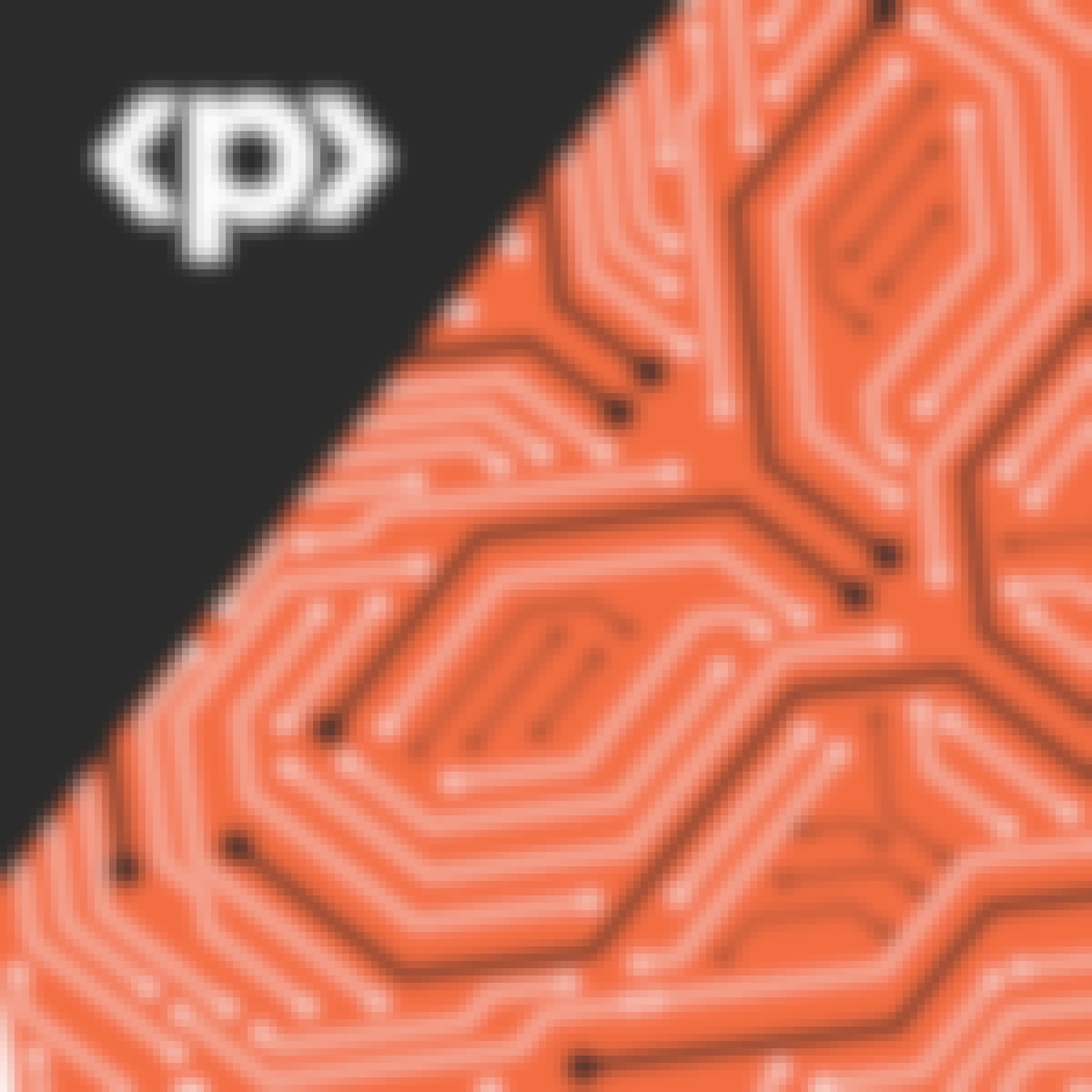
Skills you'll gain: Microsoft 365, Data Integration, Report Writing, IT Automation
Intermediate · Course · 3 - 6 Months
Searches related to visual basic
In summary, here are 10 of our most popular visual basic courses
- Introduction to Computer Programming with Visual Basic: LearnQuest
- Excel/VBA for Creative Problem Solving: University of Colorado Boulder
- C# Programming & Desktop Application Development: EDUCBA
- Introduction to Visual Basic Programming: LearnQuest
- Microsoft Excel VBA and Macros: Coursera
- C# Computer Graphics and Visual Effects Development: EDUCBA
- Excel/VBA for Creative Problem Solving, Part 1: University of Colorado Boulder
- Visual Basic Programming: Classes and Collections: LearnQuest
- Introduction to Programming With C#: Microsoft
- Programming and Data Wrangling with VBA and Excel: Logical Operations
Frequently Asked Questions about Visual Basic
Visual Basic is a programming language developed by Microsoft that is designed for building Windows applications. It is important because it provides a user-friendly environment for developers, enabling them to create software applications quickly and efficiently. With its visual interface, programmers can design user interfaces and manage code in a way that is accessible even for those who may not have extensive programming experience. This makes Visual Basic a valuable tool for both beginners and seasoned developers looking to streamline their workflow.
Jobs that involve Visual Basic often include roles such as software developer, application programmer, and systems analyst. Many organizations seek professionals who can develop and maintain applications using Visual Basic, particularly in environments that rely on Microsoft technologies. Additionally, positions in data analysis and business intelligence may also require knowledge of Visual Basic, especially when automating tasks in Excel or creating custom applications for data management.
To learn Visual Basic effectively, you should focus on several key skills. First, understanding the basics of programming concepts such as variables, data types, and control structures is essential. Familiarity with the Visual Studio environment, where Visual Basic is commonly used, will also be beneficial. Additionally, learning about object-oriented programming principles, such as classes and inheritance, will enhance your ability to create robust applications. Finally, practice with real-world projects will help solidify your skills and boost your confidence.
Some of the best online courses for Visual Basic include the Introduction to Visual Basic Programming course, which covers the fundamentals, and the Visual Basic Programming: Classes and Collections course, which dives deeper into object-oriented programming concepts. For those looking to advance their skills further, the Introduction to Computer Programming with Visual Basic Specialization offers a comprehensive curriculum.
Yes. You can start learning visual basic on Coursera for free in two ways:
- Preview the first module of many visual basic courses at no cost. This includes video lessons, readings, graded assignments, and Coursera Coach (where available).
- Start a 7-day free trial for Specializations or Coursera Plus. This gives you full access to all course content across eligible programs within the timeframe of your trial.
If you want to keep learning, earn a certificate in visual basic, or unlock full course access after the preview or trial, you can upgrade or apply for financial aid.
To learn Visual Basic, start by enrolling in an introductory course that covers the basics of the language and its applications. Dedicate time to practice coding regularly, as hands-on experience is crucial for mastering programming. Utilize online resources, such as forums and tutorials, to supplement your learning. Additionally, consider working on small projects to apply what you've learned, which will help reinforce your skills and build your confidence.
Typical topics covered in Visual Basic courses include the fundamentals of programming, user interface design, control structures, data types, and error handling. More advanced courses may explore object-oriented programming concepts, such as inheritance and polymorphism, as well as working with databases and creating applications that interact with other Microsoft Office tools. These topics provide a well-rounded foundation for anyone looking to use Visual Basic effectively.
For training and upskilling employees, courses like the Introduction to Visual Basic Programming and the Visual Basic Programming: Inheritance and Polymorphism course are excellent choices. These courses provide a structured approach to learning Visual Basic, making them suitable for organizations looking to enhance their team's programming capabilities and improve productivity.










